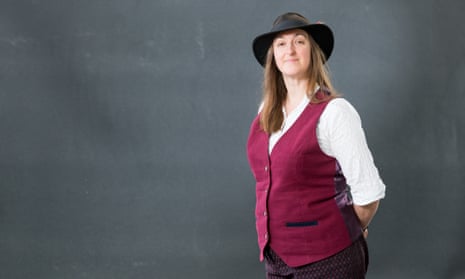According to Sturgeon’s Law, 90% of anything is crap. It was named after Theodore Sturgeon, who came to the defence of science fiction in the 1950s. “The claim (or fact) that 90% of science fiction is crap is ultimately uninformative, because science fiction conforms to the same trends of quality as all other artforms,” Sturgeon mused, confirming both the truth and the futility of his theory – ultimately, it comes down to how one defines “crap”.
Sturgeon’s law was cited during a provocative debate midway through the Edinburgh international book festival on a question that has dominated discussion for 10 days: how to define young adult (YA) fiction. But despite the intensity and frequency of this conversation, with speakers including Frances Hardinge, Marcus Sedgwick and Simon Mayo all addressing it throughout the festival, no one – not even the authors writing the books – seems sure how to define it.
Was it born from SE Hinton’s The Outsiders in the US in the 1960s, or across the pond, by Alan Garner in the UK? Is it, as a teacher was lambasted for writing in the TES last week, all about “a transgender school dropout with autism who meets a self-harming vampire with a heart of gold?” Or, is it a definition in flux, still being determined by contemporary authors as they write their books (which, without an exception, were reported to be “written for themselves”, not teens, a claim that seems at least partly untrue and somehow always defensive against some unspoken attack)?
“The great YA debate” at the festival on that middle Monday embodied the erratic focus of any debate about how to define YA, a topic that regularly bubbles up and always gets sidetracked. Is YA a genre or a category? Who reads it? Is it too grown up? Badly written? Not funny enough?
To bursts of nervous laughter, YA author Anthony McGowan kicked it off by citing Sturgeon’s Law: 90% of YA was crap, pandered to by an audience that treated the whole thing as a “this kind of amorphous quasi religion”, more of a cult than category. He lamented speaking to “monocultural audiences” of white, older women at YA conferences. Some misogynistic, cause-and-effect musing began: most YA bloggers were women, all his editors were women, “so there is a huge amount of energy directing these kinds of texts, texts that may well appeal to women in their 20s and 30s rather than to teenagers. We’ve got this female-dominated world producing texts that reflect themselves, for other young adult women,” he said, perhaps unaware of the significance of making links between gender and perceived quality (Anthony McGowan has responded to this comment here).
YA may not be a genre (it is a category, as is so often sighed), but the debate devolved into a value judgment regardless, as debates around genre so often do. “I don’t think adults should read YA stuff,” McGowan argued. “I think they should move on and read Tolstoy and Dostoyevsky or Dickens and stop reading Twilight and The Hunger Games,” McGowan said. “It is part of being a grown-up, you leave those things behind.”
This did not go down well. “I am 49, so I have lived more years of my life than I have left to live and I am not going to waste those years reading Dostoyevsky and Tolstoy!” the author Patrice Lawrence announced, to applause, from her spot in the audience.
“I was bloody fuming,” seethed one older woman, in line to pick up her copy of The Lie Tree signed by Hardinge, a couple of days later. “He completely hijacked the event. No one talked about how we define YA at all.” Her friends agreed (after hearing McGowan speak, I couldn’t help noticing they were all middle-aged). Another attendee, a children’s bookseller in her 20s, rolled her eyes when I asked if she went, likening the discussion to the TES article, now infamous among YA readers (“Another old guy who hasn’t read any YA”.)
Tellingly, YA authors at other events were always quick to espouse the greatness of their teen audience, but also quick to deny that they wrote specifically for them – the very paradox McGowan was talking about. The wide spectrum of today’s YA audience was very noticeable in the festival’s bookshops, where “adult” and “children’s” covers for the same books could be bought from the same shelf. Jenny Downham, at the great YA debate, recalled seeing her book Before I Die in both the YA and adult fiction sections. “I thought it was pretty stupid because it was taking shelf space away,” she said (though in marketing terms, it seems pretty clever).
So what did emerge from this conversation? As Wein wrote afterwards: “I don’t believe anything new and exciting was revealed, but everyone enjoyed ranting.” Did we learn that it is impossible to have a civil conversation about YA? That there is a conspiracy of women flooding the market with awful fiction?
Along with Sturgeon’s Law, there is another theory I like to believe in: Occam’s razor, that the simplest explanation is usually correct. And, simply, YA is just another category of culture going through a period of self-reflection. As in the TV we watch, the art we like, the books we read, they all must, somehow – always – improve us. A sort of moral roughage to struggle through so we can emerge from the other side reformed.
This is all the more true when children are involved; of course parents like to think all books are educational rather than purely entertaining, just as authors want to believe their works will have some sort of lasting impact on small lives. But accessibility is not an indication of stupidity any more than difficulty means worthiness. As one 20-something plaintively said to McGowan at the debate: “People should just enjoy what they enjoy.” Who cares how we define it.

Comments (…)
Sign in or create your Guardian account to join the discussion